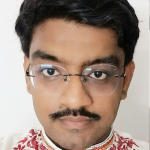
 Anirbit Mukherjee
Anirbit Mukherjee
Lecturer in Machine Learning
What are your research interests?
I am primarily interested in the mathematics of neural nets. I identify a lot with the “A.I. for Science” theme that is increasingly getting identified.
What is the focus of your current research?
Since joining Manchester, I have focused on two questions,
a) How do pairs of neural nets work together to solve differential equations? You can see this latest work of ours in this theme, https://arxiv.org/abs/2205.11359
b) Are there simple algorithms which can train neural nets well?
What are some projects or breakthroughs you wish to highlight?
Our recent paper in the Neural Networks journal gives the fastest way to train the smallest neural net. https://doi.org/10.1016/j.neunet.2022.03.040 Earlier similar results were known in the opposite extremity, that of asymptotically wide nets. I believe now it’s time to think hard about this possibility of linear time convergence existing for finitely large nets too.
Secondly, I am most excited about understanding how specific to popularly useful PDEs one can construct efficient Deep Operator Network architectures to solve them. We have taken some first steps towards that in this work, https://arxiv.org/abs/2205.11359. This theme is wholly different from most of usual M.L. where the target function is a map between finite dimensional spaces. Here the target is a map between infinite dimensional spaces. We might just be scratching only at the surface of what is possible with “Deep Learning in Infinite Dimensions”.
What memberships and awards do you hold/have you held in the past?
During my PhD at the Johns Hopkins University I got two institute fellowships, Mathematical Institute for Data Science (MINDS) Data Science Fellowship for 2019/2020 Walter L. Robb Fellowship.
What is the biggest challenge in Data Science and AI right now?
I think the biggest challenge in A.I. right now is to get the scientists in the classical sciences and conventional M.L. scientists to talk to each other regularly – and realize that they can derive dramatically new perspectives into their respective fields by thinking at the interface.
What real world challenges do you see Data Science and AI meeting in the next 25 years?
I think it’s impossible to predict the future of scientific research that far into the future! But I feel that in the near future we are going to see the usual syllabus of courses in statistics, mathematics, physics and chemistry departments having to undergo changes in response to the rise of deep-learning in their respective fields. The deepest purpose of neural nets lies in the classical sciences.
